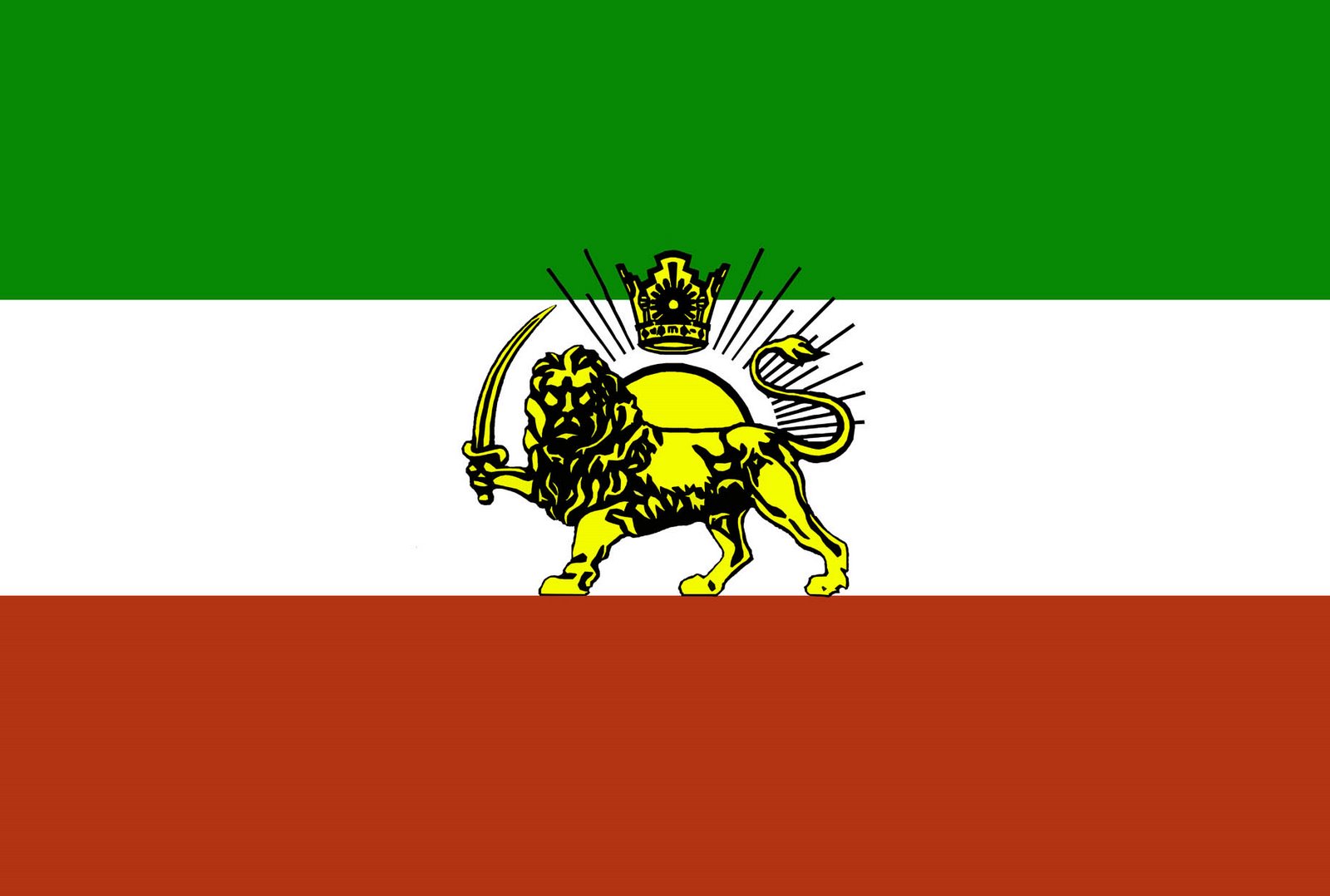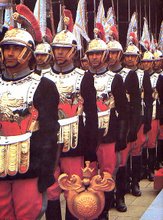Wednesday, June 18, 2008
Iranians converting OUT of Islam infuriates Islamic clergy
Zoroastrianism is Iran's ancient faith whose tenets are summed up by "Good Thoughts, Good Words, Good Deeds", and which many Iranians are now reverting back to after 1400 years of savage Islamic occupation and indoctrination. The end 1400 years of brutal and savage Islamic domination over Iranian people is slowly coming to an end.
Iranian culture has endured and persevered many brutal occupations throughout history and will come out of this ordeal victorious, stronger than ever before.
Tuesday, June 17, 2008
Infighting within the occupational Islamic Republic escalates
For those who follow Iranian affaires these revelations are old news (not this much details though) but the fact that an official has come public with them makes this an opportunity for the Iranian people to capitalize upon in building further pressure on this occupational regime. Nevertheless our compatriots should not be fooled to think that characters like Abbas Palizdar who are involved in this kind of infighting are on the peoples' side. In fact this might very well be one of the goals of Palizdar in duping people into believing he represents the "innocent faction" or better yet that he is "with the people" when in fact that is as far away from the truth as possible. Iranians should not be so gullible to make heroes out of these criminals who change colours whichever way the wind is blowing. Apart from being political infighting these individuals hope to be able to manipulate public opinion in a near future by appealing to the overwhelming resentment of the regime through the disclosure of this kind of information that targets regime officials (although in this case targeting only one faction of the regime).
Therefore my take on this story is that these now official revelations need to be capitalized upon in order to build further pressure on the occupational regime and to bring greater awareness to those Iranians who are not privy to these kind of revelations, yet at the same time we should not be fooled into building heroes out of these criminals who are only looking after their own and their own self-interest.
For further news on this story please see fellow blogger Potkin Azarmehr's posts on this topic:
The Plunder of Iran
Reactions to Palizdar's Disclosures
Palizdar is arrested
Palizdar's Father Speaks Out
Documents that Prove Palizdar was Head of Commission
Haft-Tapeh Sugar Cane Factory Workers' Strike
June 16, 2008
Libcom.org
libcom.org
Workers of the Haft-Tapeh Sugar Cane Factory in Shush escalated their fight for unpaid wages this morning by blocking the main highway into the factory. The blockade of the factory is the latest in a series of actions undertaken by workers, who are continuing their strike in the face of brutal repression by security forces.
Workers at Haft-Tapeh started their strike on May 5 to demand immediate payment of wages, which had not been received for three months prior to the strike.
Demonstrations by workers and supporters through Shush have been repeatedly attacked, with many suffering beatings and arrest at the hands of the police. A gathering outside the governor's office by 5,000 people in support of the strike on May 17 was broken up by police with clubs and tear gas, as was an attempt by workers to block a road three days later.
May 21 saw an attempted march by workers attacked by special police units who had arrived on buses the previous evening. Having taken up positions around Shush, the police, acting under orders from the Governor General to prevent any protests, were ready to arrest many workers during the day.
Several thousand workers again marched on June 10, this time on Haft-Tapeh company headquarters in Shush. They were again set upon by security forces with the resulting clashes leading to a number of arrests.
Dozens are believed to have been arrested during the strike, and remain in police custody.
Meetings held in the grounds of the factory have elected representatives to form the basis of an independent trade union, although the representatives are refusing to meet the management of Haft-Tapeh as workers insist that any offer made by management must be in the presence of the entire workforce.
In addition to the payment of outstanding wages, workers are now also demanding the removal of the factory director general and the entire management committee, the removal of the head of factory security, the release of arrested workers and dropping of all charges and legal proceedings against them, and the right to form an independent trade union.
Footage of demonstration in support of Haft-Tapeh workers in Shush, 19/05/2008 - http://www.youtube.com/watch?v=_x-EKR-55Zg
Thursday, June 12, 2008
Support the Iranian people
June 11, 2008
World Tribune
Assad Homayoun
Over the past three decades, American policy towards Iran has drifted from ineffectual to misguided while the Islamic Republic has remained an enigma for most western strategists. The regime’s rule is defined by oppression at home and aid to terrorists abroad. It routinely threatens Israel and challenges American interests where and when it can. Yet, successive American administrations have failed to develop a coherent, decisive strategy to face-down the fundamentalist regime.
Three basic strategies are in play today — one already deployed, another being flirted with, and the third ominously hinted at. Economic sanctions have been imposed since the mid 1990s with little if any effect on the regime. Much as in Iraq under Saddam Hussein, the regime has oil to fill its trough, but it is the Iranian people that bear the brunt of the economic pressure and are ultimately hurt.
Then there is the misguided counsel of direct negotiations with the regime. The only result of direct negotiations would be bestowing legitimacy upon the reviled apocalyptic regime. Is it wise for the U.S. government to help legitimize an oppressive regime that has lost the support of its own people?
The third, and most wrong-headed option regularly hinted at in government circles is military confrontation. This short sighted, ill conceived option is another example of what ails American foreign policy today — lack of knowledge and understanding of the adversary. It fails to differentiate between the Iranian people, who genuinely like the Americans, and the Islamic regime ruling Iran, which despises all things American. Besides, who in their right mind would seriously think that the American people are ready and willing to sacrifice tens of thousands of their sons and daughters yet again?
The Islamic Republic would actually welcome either of the two misguided U.S. strategies — negotiations or war. Both strategies will strengthen their repressive control over Iran and will allow them to extend their strategic hegemony over much of the Middle East, into parts of Central Asia and the Indian Ocean region.
The Islamic Republic has a long record of using negotiations as a tactic of buying time to further its illicit policies. Besides, official negotiation means officially recognizing the legitimacy of the other side — which is something the clerical regime has longed for. Official negotiations will also be interpreted as the U.S. government’s concession to the clerical regime.
Do the prime supporters of global terrorism deserve rewarding? No matter how one considers this dilemma, the fact is that the regime is despised by the majority of the people because, besides oppressing the people, it has mismanaged the economy to the point that the per capita income of an Iranian, corrected for inflation, is one third of what it was 30 years ago.
Inflation today is 24 percent according to the regime's official figures, unemployment for men is 30 percent and for women is 50 percent. The people are on the brink and the society is ready to explode, but lack of perceived international support and a vacuum of leadership has postponed the inevitable.
Bombing Iran would be militarily ineffective, and would lead to enormous, and protracted difficulties for the U.S., including tremendous loss of life as well as loss of meaningful U.S. influence in the region. It would almost certainly lead to a much more virulent conflict in Iraq, while the possibility of a full-scale war against Israel will increase exponentially. Moreover, military attacks of any nature against Iran, by the U.S. and/or Israel, would result in the devastation of Iran and un-accepted loss of life of the people — a people who, as mentioned earlier, are not the enemies of America or Israel, but who have genuine affection for both. Bombing Iran could also precipitate the balkanization of the Greater Middle East.
War has been the great ally of the clerical regime. In 1982, after only 2 years in power, the regime was almost swept from office by a groundswell of public outrage against the clerics. Khomeini embraced the war with Iraq — a war that could easily have been avoided — and used the Iranian people’s patriotic zeal to guarantee the survival and longevity of the Islamic Republic. Ahmadinejad and the clerics in Tehran once again see the possibility of using the people’s greater hatred of a foreign aggressor to dissipate their lesser hatred of the fundamentalist regime. By taking the bait, America will guarantee the longevity of the clerical regime.
But there is a ‘Fourth Option’ forward. The Iranian people, so far pawns in this political morass, have always been there, patiently waiting for any sign of real support to mount a challenge. The political history of this people is rife with examples of a seemingly oppressed and passive people suddenly rising to challenge the powers that be, when the right leadership as well as the perception of support converged. The Iranian people are fast approaching that point today.
To help leadership emerge from among the Iranian people, Washington must take a very strong, clear-cut, unequivocal stand in support for the people. The Iranian people must be assured that the U.S. government and the American people stand with them in their quest for freedom.
As a prelude to this new approach, all saber rattling must cease so that the American people and the U.S. Government are once again accepted as friends and supporters and not as possible aggressors. Then the President of the United States — the leader of the Free World — must demand that they be treated with respect and dignity. If the Iranian people are convinced that when they stand up for their own freedom, there will not stand alone, there is little doubt that they will take decisive action. Again with history as our guide, stabilizing Iran would have a tremendously positive effect on stabilizing the region.
The reality is that the U.S. should have already been following this ‘Fourth Option’. The Option should include a comprehensive psychological strategy which would empower the Iranian people to seize the situation. To keep control of the people, the clerics have artificially created a sense of siege within Iran. The siege needs to be broken.
So far, conventional policies have been the norm. The State Department’s role is to seek diplomatic solutions and open official lines of communications with foreign powers. Some quarters are also charged with finding military solutions. But no one is charged with thinking outside the box. It is time to take action and implement this logical, low cost strategy. But it is a call to help empower the people to take charge of their own lives and to bring about the changes they desire. Also it is time and absolutely necessary for internal/ external Iranians to put away their tactical differences to come up with acceptable, untainted national democratic alternative to replace the corrupt clerical government.























